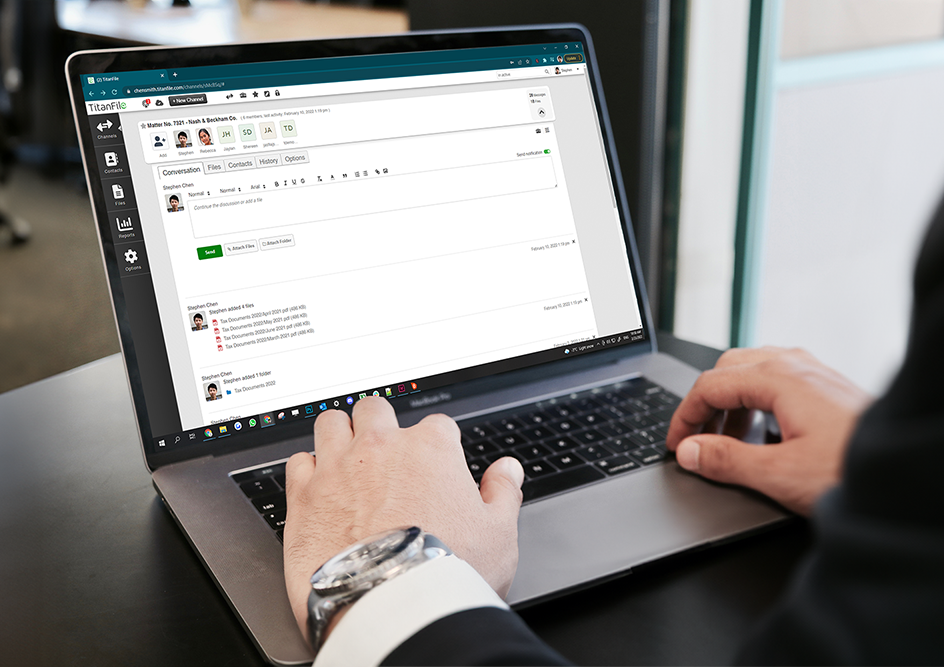It’s 2025, yet many law firms are still relying on outdated, unsecured methods to exchange sensitive documents. Surprising? Absolutely. Concerning? Even more so.
Despite handling vast volumes of confidential client data from case files to court submissions, far too many legal professionals continue to use basic email or generic cloud tools that fall short on security and compliance.
But the issue isn’t just resistance to change. Often, it’s the perception that secure file sharing for lawyers is complex, time-consuming, or difficult to adopt.
In this guide, we’ll break down why traditional file-sharing methods no longer suffice, what risks they pose, and how modern solutions make it easier than ever to share legal documents securely, while staying compliant with regulations like PIPEDA and HIPAA.
Importance of Secure File Sharing for Lawyers
Law firms manage sensitive documents, such as confidential client agreements, deposition transcripts, court filings, and more. All of these documents require stringent security measures.
Any breach of these documents can pose a risk to both the client’s case and the firm’s reputation.
File sharing occurs quite frequently in the profession. In fact, it is an inevitable process on many occasions, such as:
-
Collaborating with co-counsel
-
Sending evidence for review
-
Coordinating with external services like legal transcription companies
Ensuring that these and all such exchanges happen securely should be the priority of any law firm.
Yet, many law firms still rely on outdated and insecure methods like email or basic cloud storage.

It might surprise you, but a significant number of legal professionals still share files via email despite its well-documented risks and overlook legal secure file share options.
But why don’t law firms adopt secure file-sharing technologies then? One reason is the profession’s traditional nature.
Many attorneys are accustomed to doing things the way they’ve always done. Overhauling their systems intimidates them and barely fits into their tight schedules. Not to mention the potential steep learning curve, as most lawyers may not be tech-savvy.
While these barriers are valid, the cost of inaction is huge.
According to the American Bar Association’s 2022 Legal Technology Survey Report, about 25% of law firms have experienced a security breach.
These risks highlight the urgent need for secure file sharing systems in law firms to safeguard sensitive information and maintain client trust.
In this lawyer’s guide to secure file sharing, we will discuss the tools available. First, let’s briefly review the issues caused by traditional file sharing and management methods.
Challenges Faced by Lawyers in File Sharing
The traditional ways of managing files no longer cut it, especially in the legal industry. Why exactly? Let’s find out.
-
Difficulty in locating the Docs: Many law firms lack standard naming conventions or consistent processes for organizing files. Each attorney or paralegal often creates their own system, which leads to hours wasted searching, or worse, realizing the document is gone. All this time could be spent on client work.
-
No version control: When multiple versions of a file exist across platforms, it’s easy to lose track of what’s current. Teams often end up recreating documents from scratch, which adds confusion and risks inconsistencies in critical cases.
-
Weak links in security: Law firms may unintentionally expose sensitive data due to inadequate permissions management. Files can sometimes be stored in personal accounts, not out of bad intentions, but because of insufficient systems in place. If permissions are not strictly controlled, there is a risk that sensitive files could fall into the wrong hands.
-
Files scattered across the firm: Many law offices face the reality of files being stored everywhere. Some documents reside on local servers, others are found on individual laptops, and some are even hidden away in emails, text messages, or paper folders.
-
Email overload: Sending files via email can often lead to more complications than solutions. Important information gets trapped in individual inboxes, making collaboration difficult. Additionally, a single mistake, such as replying to the wrong person, can result in sensitive information being unintentionally sent to opposing counsel. This is why secure email solutions are essential for lawyers.
-
Outdated Systems: Law firms aren’t exactly known for embracing change quickly. Many still rely on outdated systems like clunky software or paper-heavy processes.
-
Compliance issues: Law firms must adhere to strict data protection regulations, and firms that fail to do so face hefty fines or legal repercussions. Having a PIPEDA-compliant file sharing protects client confidentiality and meets regulatory requirements. Non-compliance not only jeopardizes sensitive information but also undermines client trust.
Best Practices for Lawyers Using Secure File Sharing
As any lawyer’s guide to secure file sharing will tell you, secure file sharing also comes down to how you use a tool. Here are some best practices to follow:
-
Walk clients through the file-sharing platform and explain why secure sharing is essential for protecting their data.
-
Use role-based permissions to ensure only authorized individuals handle sensitive files.
-
Stay updated on jurisdiction-specific data privacy laws and client confidentiality requirements.
-
Schedule periodic reviews of your sharing platform and overall security setup.
-
Enabling two-factor authentication to block unauthorized access in case passwords are compromised.
-
Always keep a secure backup of important documents to recover from data loss or unexpected breaches.
Essential Features of Secure File Sharing Tools
Traditional methods and tools have overstayed their welcome. It’s high time more lawyers turn to secure file sharing solutions for lawyers that are purpose-built for the legal industry.
Our lawyer’s guide to secure file sharing lists what defines a good legal document-sharing solution.
-
Reliable platform choice: The solution is designed for legal professionals. It should comply with key privacy regulations like HIPAA and GDPR for client data protection.
-
End-to-end encryption: It encrypts files both in transit and at rest, so only the intended recipient can access the information, not eavesdroppers.
-
Role-based access controls: It allows you to specify access control of files to minimize the risk of accidental or unauthorized data exposure.
-
Strong password policies: Robust password requirements, including multi-factor authentication, are a critical security measure against breaches.
-
Client-friendly portals: Offers a secure client portal where clients can access their documents, upload files, and communicate with your firm directly.
-
Ease of use: If it’s too complicated, even the best security features won’t matter because your team won’t know how to use them.
-
File expiration settings: Allows setting expiration dates on shared files to automatically revoke access after a specific period.
-
Data backup and recovery: Backs up client files regularly and includes disaster recovery options in emergencies.
-
Support for large files: Unlike email, it should allow sending large files without delivery failures.
-
Compliance readiness: Simplifies meeting legal industry requirements like HIPAA, GDPR, and more to reduce risks of non-compliance penalties.
-
File type compatibility: Allows sharing of many file types (documents, images, multimedia, etc).
-
Remote data wiping: Provides a way to remotely delete sensitive files from remote devices if, let’s say, a team member leaves the firm.
-
E-signatures: Electronic signature features save time and streamline the signing process. Make sure it has these.
-
Decently Priced Plans: The platform fits your firm’s budget while still delivering the features you need.
Now that we know the importance, challenges, and features of confidential file sharing tools for attorneys, it’s time to understand how to send legal documents securely.
Top Secure File Sharing Tools for Law Firms
Now that we’ve covered the essential features, this secure file sharing guide for lawyers will walk you through top tools that meet (if not exceed) those requirements.
1. TitanFile
For lawyers seeking a secure, intuitive file-sharing solution tailored to legal workflows, TitanFile is a top choice. Its drag-and-drop interface makes it effortless to upload entire folders, preserving structure and saving valuable time while delivering enterprise-grade security and compliance out of the box.
Then, you have state-of-the-art security with end-to-end encryption both at rest and in motion. There’s user authentication with techniques like two-factor Authentication (2FA) and Single Sign-On (SSO).
In addition, compliance is baked into the platform. TitanFile meets HIPAA, GDPR, PIPEDA, and other important standards.
With HIPAA secure file share and many other functional and security features, TitanFile covers all the bases. This is why Littler Mendelson, the largest employment law firm in the U.S., trusts TitanFile for its file-sharing needs.
2. Clio
Clio is a full-fledged law firm management platform, not just a file sharer.
It’s secure client portal allows for document e-signatures, client communication, file sharing, and whatnot, all in one place.
Two of its main subproducts are:
-
Clio Manage: Helps lawyers organize cases, boost productivity, and track performance with features like a law firm dashboard.
-
Clio Grow: Facilitates onboarding and offers a free website builder to get your online presence up and running quickly.
Clio also has a mobile app that lets you access case and client information and perform other small tasks on the go.
3. Dropbox
Dropbox is one of the most recognizable file-sharing tools, and many lawyers already use it.
Its business accounts come with added security features like password protection, link expiration, and remote account wiping for former employees.
However, Dropbox’s simplicity can also be a downside. Without legal-specific features like advanced document management or case categorization, it requires extra effort to stay organized.
Law firms may find it lacking in features made for their specific needs.
Legal and Ethical Considerations
Lawyers are bound by both legal and ethical obligations.
Legal mandates include data privacy laws, such as GDPR or HIPAA, which set strict standards for handling sensitive information. Failure to comply with these standards can result in hefty fines and, more importantly, damage to your reputation.
Then, there are ethical obligations. These require lawyers to take every possible step to protect client data from unauthorized access or breaches.
Clients count on you to protect their most personal and sensitive details. So, make sure the tools you use give you the control to decide who sees what and when, in addition to security features.
Optimal Solution For Lawyers
The key takeaway from this secure file sharing guide for lawyers is simple: choosing the right tools is critical to protecting client data and streamlining your practice.
For law firms, success hinges on having a secure large file transfer solution that meets the highest standards of compliance. There’s no room for compromise.
That’s where TitanFile shines. Purpose-built for legal professionals, it combines enterprise-grade security, including end-to-end encryption, with an intuitive client portal designed to streamline collaboration. The result? A seamless way to exchange files that’s as secure as it is simple.
So what’s the bottom line? Outdated tools cannot meet the demands of modern law. If your firm still relies on traditional methods, it’s time to adapt.
Choose TitanFile and move your practice forward with confidence.


